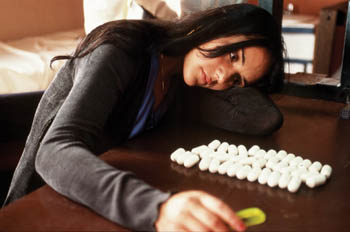![[Metroactive Movies]](/movies/gifs/movies468.gif)
[ Movies Index | Show Times | Silicon Valley | Metroactive Home | Archives ]

All Keyed Up: Catalina Sandino Moreno contemplates the fate of a mule in 'Maria Full of Grace.' Cash and Carry A young woman braves customs and dealers to survive as a cocaine smuggler in 'Maria Full of Grace' MY FAVORITE formative film-watching years took place during a period of extreme shock in the movies. Ticket sales were at record low, and anything that could create a sex-and-violence sensation was tried out by even the most mainstream studios and exhibitors. My point is that I wasn't easily shocked. However, I walked out right during the title sequence of Oliver Stone's Midnight Express (heartbeat thumping on the soundtrack, Brad Davis duct-taping slabs of hashish to his waist). I couldn't bear to be put through it. Probably this was just post-traumatic stress disorder from multiple encounters from the LAPD. Since I was a longhair who stayed out late, I was frequently pulled over, and I often had something in my car I didn't want the cops to find. Maria Full of Grace is a thriller about smuggling that looks almost like an investigative report on the procedures by which we get our cocaine. In its intimate scale, the film is as nerve-wracking as Clouzot's The Wages of Fear. Colombian-born New York director Joshua Marston makes a startling debut. His film is tense, but you can't look away. Catalina Sandino Moreno plays a girl who risks her life for the sake of her unborn daughter. Maria's life in modern Colombia is sketched out briefly but incisively. It's like the circumstances in so many off-the-interstate American towns, but ever so much worse. At the beginning, 17-year-old Maria's making out with her novio Juan (Wilson Guerrero); they lean against the side of an abandoned building in a picturesque but poor town outside Bogotá. Maria spontaneously decides to climb up to the top of the building just for the sake of a better view. Juan won't go. Right away, Marston tells us everything about Maria and her ambitions. We also pick up hints of pregnancy that Juan, an overgrown boy, is too juvenile to notice. Maria works with her friend Blanca (Yenny Paola Vaga) at a packing plant, stripping thorns off plantation-grown long-stemmed roses so that they won't scratch North American hands. When morning sickness first strikes Maria, her supervisor won't let her go to the bathroom. The headstrong girl walks off the job. This infuriates Maria's mother and older sister. Her family can't believe that Maria is crazy enough to blow off a job that's helping to support them, as well as Maria's niece, a sickly, fatherless baby. Through a new friend, Maria learns of a possible job as a mula, a drug mule, a line of work she knows almost nothing about. As Maria goes up the chain, she is angered to discover that Blanca has been recruited, too. Separately, the two go to their date with a pharmacist in Bogotá. The cocaine is wrapped in layers of latex, squeezed in a jack into a parcel about the size of an O.B. tampon. These parcels are dipped into what looks like melted butter or chicken broth. Maria defeats her gag reflex 62 times (she practiced by swallowing large grapes whole). The New England Journal of Medicine suggests that such pellets are about 10 grams each. According to the U.S. Department of Justice, a mule can carry from 800 grams to 1.25 kilos. Maria carries something lower than the low end of that, 620 grams. Let's guesstimate that there's more than a pound of uncut cocaine in her gastrointestinal tract. It's death for her if any of the parcels rupture; it's death for her relatives if any of the parcels get lost. She takes the long plane trip to the United States, where she's detained by customs. Maria fits the profile—being a barely literate small-town Colombian girl who somehow got her hands on a ticket to the United States. The officers at customs are brutally insistent, but they never seem like sadistic monsters. They're weary enforcers of a law so many people seem determined to outwit. The real frighteners lie on the other side of the line, when Maria ends up in a scabby motel (either in Queens or Jersey) with her two fellow mules, waiting for their bowels to move the cargo out of their bodies. Marston's particularly effective at keeping this story tight and low-key. Moreno's fierceness and natural magnetism pull you through the parts that seem too intense to watch. She gives one of the most accomplished movie performances this year. Moreno is as young and sweet-faced as Natalie Wood was, but she is a much less affected performer. A weaker actress would soften the places where she confronts her family or drops her ineffectual boyfriend. Marston bravely avoids melodrama. Maria Full of Grace always seems true to life. Maria's choices and her gamble evince the logic of desperation. Her story is the story that gets left out of both anti-drug propaganda and Hollywood movies. From the start, we think of Maria as a brave and determined girl. She's not a victim of circumstances; she's a war heroine on the other side of the never-ending drug wars.
Maria Full of Grace (R; 101 min.), directed and written by Joshua Marston, photographed by Jim Denault and starring Catalina Sandino Moreno, opens Friday at selected theaters.
Send a letter to the editor about this story to letters@metronews.com. [ Silicon Valley | Metroactive Home | Archives ]
|
From the July 28-August 3, 2004 issue of Metro, Silicon Valley's Weekly Newspaper.
Copyright © Metro Publishing Inc. Metroactive is affiliated with the Boulevards Network.
For more information about the San Jose/Silicon Valley area, visit sanjose.com.